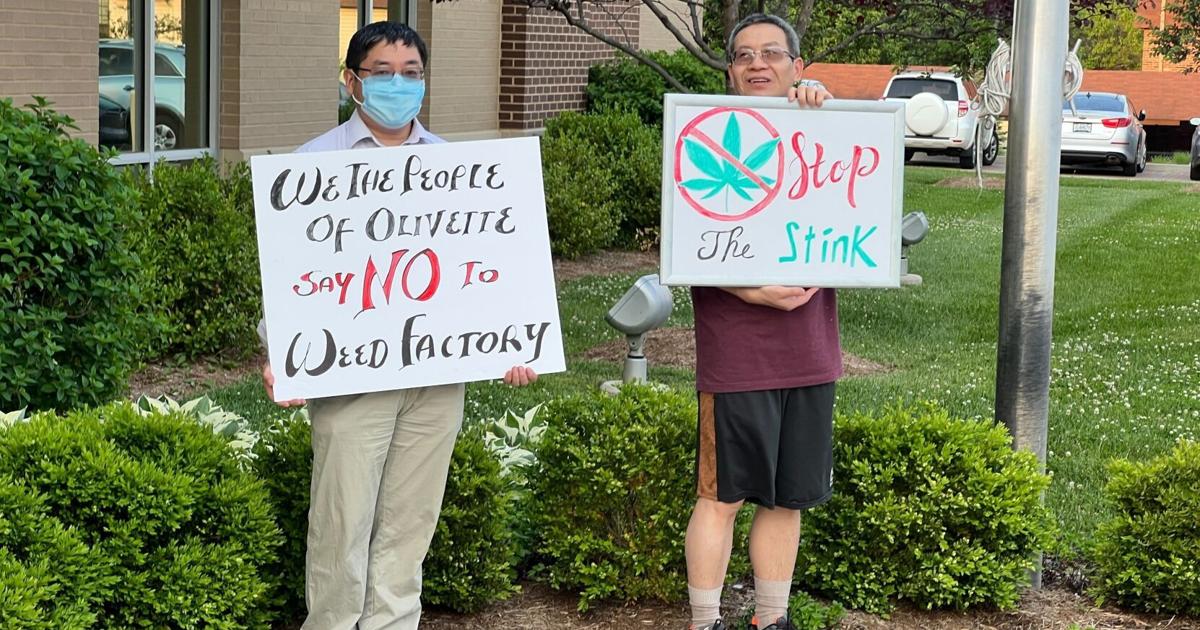Olivette weighs an order to restrict marijuana grow operations
OLIVETTE — Olivette City Council could vote Tuesday to ban medical pot grow facilities within 750 feet of homes and require all odors to be “minimally detectable” outside doors.
The proposed ordinance comes months after dozens of residents successfully shut down Proper Cannabis’ plans to grow pot in a warehouse near homes, complaining that the farm would fill their air with funky smells that would drive the value down. of their properties and threaten the health of residents. The proposed buffer zone would maintain pot farms in two corners zoned for light industry in the 2.77 square mile town of about 8,450 people.
But some locals like Nina Miller want the city to go one step further: force pot farms to stop any smell leaks.
“If they can’t guarantee no smell will escape the building, they can’t have a facility,” said Miller, who lives near the light industrial area where the pot farms are expected to go. . “If the smell is escaping the building, then it has escaped…and on a windy day it will be in my garden and I don’t want it.”
People also read…
Proper Cannabis CEO John Pennington, who has since suspended the search for a second farm location, said a zero-odor law sets an “impossible standard”.
“That would be like requiring a barbecue restaurant to remove barbecue odors, period,” he said. “The key is to make sure that all omitted air is safe, compliant, and non-hazardous to anyone. And that’s how we run our business.
Debate over how much to smell is too big as Missouri voters consider Amendment 3 to legalize recreational use of marijuana, a change that could lead to greater demand for weed, more pot farms to grow it and more decisions for residents and city planners if pot growers want to move in.
Cities would have the additional option of banning pot retail businesses through a public vote every four years, although it’s unclear whether any cities would choose this option.
But if Olivette’s bill passes, it would make the city the third local government in the area to establish a residential buffer for pot farms, ordinances that would likely remain in place if recreational marijuana becomes legal. University City has a residential buffer zone of 1,000 feet. In St. Charles County, Lake Saint Louis has a residential buffer zone of 500 feet.
John Payne, campaign director for Legal Missouri 2022, the leading group campaigning for passage of Amendment 3, said residential tampons and zero-odor regulations could violate state law by calling them restrictions “unduly heavy”.
The ballot initiative that legalized medical pot in 2018 prevented local governments from banning it outright, but allowed cities to set certain conditions on where and when businesses could operate.
The state banned odors from reaching the level of a nuisance and set a default maximum buffer zone of 1,000 feet for schools, daycare centers and places of worship, but banned cities from being more restrictive.
“You have to strike a balance,” Payne said, “that respects people’s right not to have an overwhelming smell, but also that a business has the right to locate in an area that’s properly zoned for it. “
Olivette Mayor Maxine Weil declined to comment on whether the city would pass tougher odor regulations ahead of Tuesday’s meeting.
In an emailed statement, Weil said the order before council “serves to ensure and protect the health, safety, welfare and property values of the city and its residents and businesses, while simultaneously following the letter and intent of Article XIV Section 1 of the Missouri Constitution.
For now, local governments don’t see any zoning issues coming up if marijuana is legalized, said Pat Kelly, a former Brentwood mayor who now heads the Municipal League of Metropolitan St. Louis, which represents the county’s 88 municipalities. of St. Louis.
“Like any other business, sometimes you have a problem, like with zoning a new gas station,” Kelly said. “But I think generally cities are prepared for it.”
Olivette is at least the second suburb where residents and existing businesses have opposed a new pot company wanting to move there, raising concerns about odors and public safety. Residents of Des Peres, for example, have spent weeks trying unsuccessfully to fight a new dispensary.
But overall, medical marijuana businesses have sprung up in the St. Louis area without strong opposition since Missouri voters legalized medical marijuana in 2018.
If there was a major concern, it was the smell of pot farms, Kelly said.
But most of the commercial growers serving St. Louis-area dispensaries are in rural or industrial areas and have so far moved far enough from neighborhoods to avoid any problems.
There are at least 16 commercial pot farms in St. Louis, St. Louis County, and St. Charles County. The exact locations are unclear as most commercial growers hide their exact addresses for security reasons.
Several pot farms are found north and south of Saint-Louis, in industrial areas along the river. Earth City, part of unincorporated St. Louis County, is home to BeLeaf, which has turned a former CBD factory in a business park into a medical pot farm. O’Fallon and St. Ann each have a pot farm. Maryland Heights will soon be: City Council in September unanimously approved a permit for an indoor medical cannabis farm in a building formerly used by an Anheuser-Busch distributor.
Two St. Ann aldermen contacted this week said they had heard no concerns about odors from the town factory. A spokesperson for O’Fallon said the city hasn’t heard any complaints about its facilities either.
But in Olivette, residents like Kate Pichon-Hellmann say they can still smell the smell of the Proper Cannabis farm in nearby Rock Hill, despite an order ‘that marijuana odors cannot be detected. from outside the structure.
Rock Hill Mayor Edward Mahan did not respond to several recent requests for comment.
Pennington said the plant uses air and carbon filtration systems, conducts regular air quality testing, and follows federal and state standards, “just like any other manufacturing company.”
Pichon-Hellmann said the residents of Olivette want to clarify that “no smell” is allowed to make it easier to enforce. And the bill could be modified to fit the retail jar.
“If its minimal odor, what does minimal odor mean?” she says. “No smell is clear enough.”
But for now, she’s happy with the bill, which could be changed if recreational marijuana is legalized.
“All you would have to do is drop the word medical,” she said.
Payne said the marijuana industry isn’t too worried after all. Other cities are more open for business.
“The advantage of having over 80 municipalities is that if you don’t like it, you probably like it, and you can try to figure that out and find one that will work with you,” he said. .
Missourians will vote on November 8 to fully legalize marijuana. Secretary of State Jay Ashcroft’s office on Tuesday, August 9, 2022, announced that the campaign had received enough signatures to present to Missouri voters.






Comments are closed.